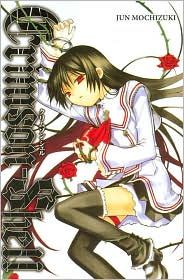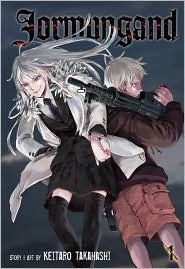Today I look at 2 very different manga titles released in November -- Crimson Shell (one-shot by Jun Mochizuki) and Jormungand vol 1 (by Keitaro Takahashi).
Crimson Shell by Jun Mochizuki. Crimson Shell is a single volume release that tries to cram about 5 volumes of plot into one. Ambition in storytelling isn't a bad thing but in this fantasy story -- about a girl who has a special power planted in her body in the form of a "red rose seed" -- the reader is bombarded with plot-twist after plot-twist. The heroine, Claudia, is betrayed by the dark swordsman who once rescued her from an isolated existence and had helped her to draw on her powers to fight those who have been contaminated by the deadly Black Rose. Her only thought after the betrayal is to save him, a task made more complicated by the fact she constantly finds herself among people who are always revealed to have hidden motivations for getting close to her.
In a way, Crimson Shell draws on fairy tale-esque imagery (red roses, girl "woken" from a kind of slumber by a knight), while not actually trying to reproduce any particular fairy tale. One thing that surprised me is that in spite of feeling overwhelmed by the complexity of the plot in this manga, I never wanted to stop reading the volume. The art -- while still in what I think of as a Square-Enix "house style" -- integrates the imagery of roses to offer a distinctive twist on that style. It is hard to see a beautiful rose and not be reminded of the thorns lurking there, which is exactly the kind of tone Mochizuki manages to maintain throughout the volume.
This is a flawed comic but it should be noted it is also Jun Mochizuki's very first collected work. As such, it actually bodes well that the book is overwhelming rather than underwhelming, which means I am looking forward to checking out the upcoming December release of Pandora Hearts (also by Mochizuki) to see how she develops as a creator.
Review Copy provided by Yen Press.
Jormungand volume 1, by Keitario Takahashi. In many ways, Jormungand -- an action tale detailing the dangerous missions of a group of arms dealers -- feels unfinished. It has sketchy art, somewhat shallow characterization, and plots that lack a certain level of coherence. The book hangs on the figure of Jonah, a young West Asian boy who has lost his parents to a war (I don't believe any particular war is identified as the culprit) and as a result has become a child soldier. The book opens when he joins the gung-ho Koko's crew of mercenaries (i.e. "M.O.D." or Merchants of Death). Jonah, therefore, becomes a peddler of the very thing he claims to hate the most -- guns. In other words, from the start his characterization is rather cloudy, but then there's a lot that doesn't make much sense in this book. Admittedly, there is a purposeful sense of perversity instilled in book -- after all, a boy who hates guns decides to sell them and a group that sells weapons claims to be working "to promote world peace."
Koko -- the leader who is a bit reminiscent of Revy from Black Lagoon -- is clearly the figure (or should I use the more offensive, but descriptive, phrase "hot chick"?) in this book who has a thing for both madness and violence (and, of course, seems the most hyped when those things are all tangled up together) but she lacks the charismatic pull Revy has. And as a whole that is what the book suffers from the most -- more than just a sense of consistent characterization, these characters lack the hook that makes us care about what happens to them and why they got in the weapons business in the first place. In a violent action story it helps immensely if we care about whether or not the characters are going to live to see tomorrow, particularly in order to interest us in the dangerous games they are playing in each chapter, but this first volume wasn't able to inspire either emotion in me.
Review Copy provided by Viz.



